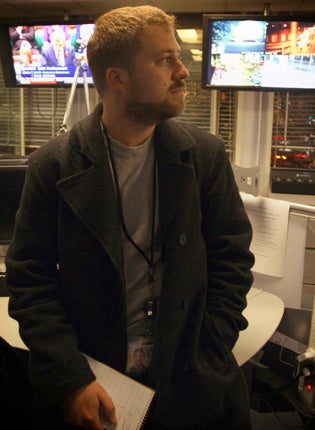Justin Fenton in London: Britain's use of DNA is light years ahead
In the latest instalment of our crime reporter's job-swap with his counterpart at 'The Baltimore Sun', the combustible relationship between politicians and the police force in the Maryland city comes under the microscope

London's police stations could offer a view of the future of American policing – if the political will is there to make it happen.
Touring a police station in Brixton, I was shown a tiny room with a machine the size of a refrigerator that takes fingerprints from criminal suspects. This room was also where police collected DNA samples from everyone who passes through.
DNA collection is expanding in America; in the state of Maryland, Governor Martin O'Malley just recently pushed through legislation to broaden DNA collection capabilities to include individuals charged with crimes of violence, 1st, 2nd, or 3rd degree burglary or attempting these crimes.
But this is still a long way from Britain where you don't need to be charged with an offence for your DNA to be taken and you can end up on the database even if you're never found guilty of a crime.
When Mr O'Malley proposed the extension (previously you had to be convicted of a crime to have your DNA taken) there was fierce opposition: the American Civil Liberties Union, the legislature's black caucus, and the National Association for the Advancement of Colored People criticised the initiative, with one black politician calling it "high-tech (racial) profiling".
More than 46,000 samples have been uploaded since the bill passed, used to make 155 arrests, including 15 for homicides and 76 for sexual assaults. In Britain, 4.5 million people are on the database
Then there is CCTV. Upstairs in Brixton two officers sat at computers, with three flat screen televisions in front of them. One was tuned to "The X-factor", but the others were scanning the wide array of CCTV cameras set up around the area. Use of cameras is also expanding in America. In Baltimore specifically, police have "blue light cameras" that flash to make their presence known, and others that can't be viewed live.
But the number of live cameras is increasing, with the private networks being integrated into a central system viewed from a room downtown called The Atrium. Officials I've spoken to seem lukewarm on the effectiveness.
I've written about homicide suspects tracked in real time fleeing the scene who were apprehended thanks to people manning the cameras, though there's also been instances where the video was used against police to contradict a story, or wasn't as good as advertised and swayed a jury away from the prosecutor's version of the events.
Use of CCTV is largely in its infancy, with cities beefing up their networks, and to the average citizen the idea of being constantly monitored remains a foreign, and to some, chilling concept.
I was also intrigued by the drug testing and counselling that is imposed upon arrest. Baltimore's steep drug problem could benefit from counselling that is made part of bail restrictions here – then again, it's hard to imagine that the public would entrust our police with such a task, and the thought of law enforcement adding drug treatment to its heavy workload would seem unreasonable to police.
Tell us what you think of crime in the UK. Email us your experiences at copy@independent.co.uk
Subscribe to Independent Premium to bookmark this article
Want to bookmark your favourite articles and stories to read or reference later? Start your Independent Premium subscription today.
